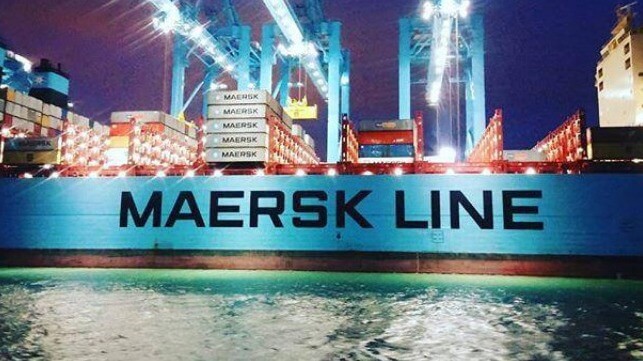Maersk Accelerates Net Zero Targets by a Decade Across All Operations

A.P. Moller - Maersk announced ambitious plans to accelerate efforts across all parts of its operations to achieve net-zero emissions. Maersk has sought to take a leadership role reflecting the increasing number of global shippers looking at the carbon emissions from the global supply chain.
Saying that it seeks to align its operations with the net zero criteria of the non-profit Science Based Targets initiative, which measures companies’ efforts to limit global warming, Maersk reduced by 10 years its ambitions to achieve net zero greenhouse gas emissions while also setting new interim targets and launching tools to contribute to the progress.
The targets go beyond previous efforts to reduce emissions related to the ocean fleet Maersk noted as they now cover all direct and indirect emissions across the entire Maersk business.
“It is a strategic imperative for Maersk to extend our net zero ambition to the total footprint of the business,” said Soren Skou, CEO of A.P. Moller - Maersk. “The science is clear, we must act now to deliver significant progress in this decade. These very ambitious targets mark our commitment to society and to the many customers who call for net zero supply chains.”
In addition to advanced the end goal to 2040 from 2050, new near-term targets were set for 2030 to ensure significant progress on curbing direct emissions in this decade. These include a 50 percent reduction in emissions per transported container from the company’s ocean fleet and a 70 percent reduction in absolute emissions from terminals that Maersk fully controls. The company said depending on growth in the ocean business, this will lead to absolute emissions reductions between 35 and 50 percent from a 2020 baseline.
In announcing the new targets, Skou told the Financial Times that they are seeking to be a leader reflecting the interests of their customers. He admitted when the company first set its targets “we didn’t have an idea how to get there.” Maersk in the past year, however, has pushed forward with initiatives that begin to lay the foundation while they said it would remain a challenge.
Maersk placed the first orders for dual-fuel containerships designed to operate full-time on methanol as the new fuel source becomes more available. First, they ordered a pioneering feeder hip for operations in the North Sea area but quickly followed with an order for eight 16,000 TEU vessels for the global fleet and earlier this week confirmed that they would also exercise the option for four additional 16,000 TEU vessels to operate on methanol. It is, however, a small step for a company that currently operates 735 vessels.
Maersk has also announced a series of investments in start-up and emerging technologies, especially focusing on methanol production. In ordering the new vessels the company admitted at introduction there would likely not be a sufficient supply of the alternative fuel for full-time global operations.
“Our updated targets and accelerated timelines reflect a very challenging, yet viable pathway to net zero which is driven by advances in technology and solutions,” said Henriette Hallberg Thygesen, CEO of Fleet & Strategic Brands, A.P. Moller - Maersk. “What is needed is a rapid scale-up which we will strive to achieve in close collaboration with customers and suppliers across the entire supply chain,”
To maximize progress towards net zero supply chains in 2040, ambitious 2030 targets for a range of green product offerings are introduced, adding to solutions including Maersk’s Emissions Dashboard and Maersk ECO Delivery. These products will utilize green technologies and solutions to ensure that they provide real emission reductions within the supply chain. They also continue to push the initiative saying that in 2022 they will also be setting targets for other aspects of the operations including inland transportation.
